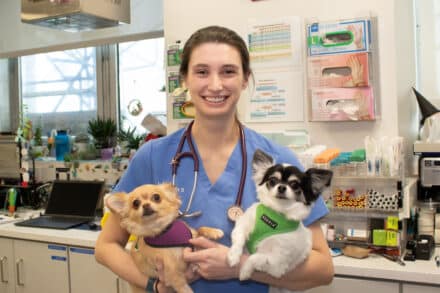Cardiology
Expert Care for Pets with Heart and Lung Diseases, Coughing, and Breathing Problems
AMC’s world-class team of cardiologists diagnose and treat pets with congenital or acquired heart disease and pets who cough or have breathing problems. Our team of board certified veterinarians is trained to rapidly diagnose and effectively manage heart failure and many other diseases that may develop during the course of a pet’s life.
Compassionate care. AMC’s Cardiology Service has a long and established reputation for excellence in providing compassionate and effective healthcare. We comprehensively evaluate your pet, explain the best treatment options, and take the time answer all of your questions.
Collaborative care. Our Cardiologists partner closely with other specialists at AMC to provide the best possible medical advice and therapy. These experts include board certified specialists in Internal Medicine, Radiology, Pathology, Emergency and Critical Care, Surgery, in addition to Licensed Veterinary Technicians and Veterinary Assistants. This means you’re often getting the benefit of multiple expert opinions. Together, our specialists focus on each pet’s needs, identify the most helpful tests, and employ the most advanced procedures.
Research. AMC’s Cardiology Service has a long tradition of contributing to medical research and searching for ways to improve diagnosis and quality of life. These innovative research programs make new scientific information available before it is published, can offer promising new therapies through clinical trials, and may reduce some medical costs. AMC’s Cardiologists collaborate with experts in veterinary and human medicine across the country and throughout the world to help advance care for heart failure patients.
Education. AMC’s Cardiologists help train future veterinary leaders through advanced post graduate programs. They also lead continuing education programs for veterinarians, both within the tristate region and internationally. This education contributes to improved patient care.
Symptoms of Heart and Respiratory Disease
If your pet is experiencing any of the following symptoms, they may benefit from a consultation with AMC’s Cardiology team:
- Coughing
- Breathing problems or shortness of breath
- Heart murmur
- Heart failure
- Irregular heartbeat (arrhythmia)
- Weakness, fainting, or collapse
- Congenital heart disease (birth disorders)
- Acquired heart disease
- Elevated systemic blood pressure (arterial hypertension)
- Elevated lung blood pressure (pulmonary hypertension)
- Infectious diseases (such as heart worm disease or bacterial heart infections)
Patients of AMC’s Cardiology Department benefit from compassionate and collaborative care, including:
- A comprehensive treatment plan for the prevention of heart failure
- Safe and effective long-term health management of heart disease
- Improvement and maintenance of quality of life
- Assessments for the risk of anesthesia
Diagnostic Procedures
AMC’s Cardiology team employs safe and effective non-invasive technologies to evaluate pets with suspected heart or lung disease. These technologies include:
- Echocardiography and Doppler Echocardiography to safely image the heart and its valves, assess blood flow, determine the cause of heart murmurs, assess the strength and health of the heart muscle, and detect fluid accumulation and tumors
- Radiography (chest x-rays) to provide essential information about the chest and internal organs
- Electrocardiography (ECG) and Holter ECG to assess the heart rate, rhythm, and potential irregularities (arrhythmias)
- Laboratory blood tests to evaluate kidney function, thyroid status, and other important parameters
- Other specialized tests to indicate both the presence and severity of heart disease
Minimally Invasive and Interventional Procedures
Certain congenital heart defects can be corrected or improved by interventional procedures, including patent ductus arteriosus (ductal occlusion), congenital pulmonic stenosis (balloon valvuloplasty), and others.
AMC Cardiologists also perform pacemaker implantation for dogs and cats whose heart rate is dangerously low.
Assessment for Risk of Anesthesia
Pets with heart or respiratory conditions may be at risk when undergoing anesthesia. These animals can benefit from a cardiology consultation – it allows us to assess potential hazards and work with the surgical team to plan the best and safest methods.
Our Team
DVM, MSc, DACVIM/ECVIM (Cardiology), DACVECC
Vincent Astor Chair in Comparative Medicine
Director of the Caspary Research Institute
Cardiology Residency Program Director


































